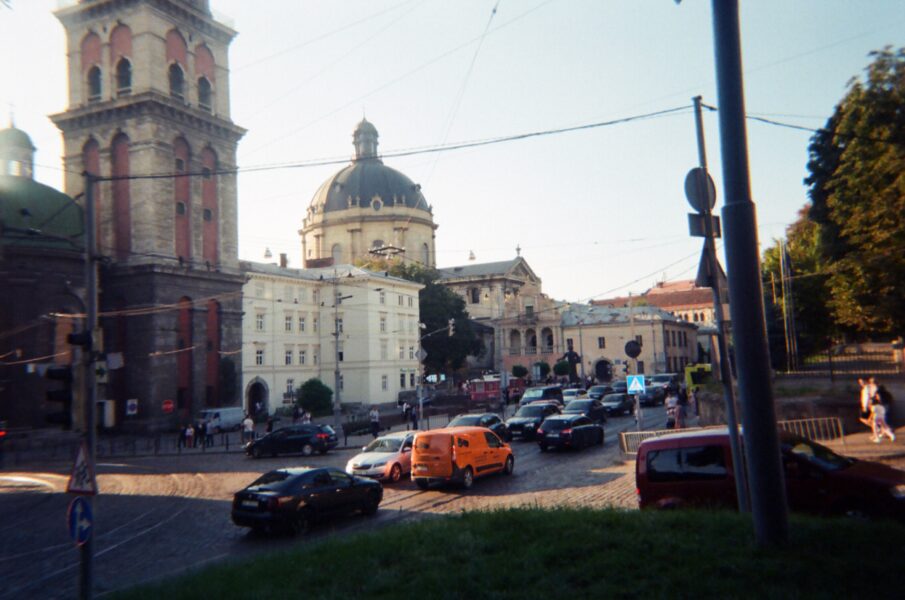
Before I would return to uni for my third and final year, I decided to spend the last two weeks of the summer holiday in Ukraine’s westernmost city, Lviv. I wanted to assist the Ukrainian cause in any way I could for my short time there.
After some research, I discovered a couple of volunteering opportunities in Lviv and looked into the city. Though its geographical placement has made it seem a ‘safe haven’ relative to other more Eastern cities in Ukraine, it has endured frequent missile strikes which have destroyed buildings and led to the injury and deaths of several people. The UK Foreign Office advises against going. I set off on September 5th with the knowledge that less than two months prior, 10 civilians had been killed in an air attack on Lviv, and the most recent missile strike had been on August 15th.
Getting to Lviv wasn’t simple. I had to get a flight into Krakow in Poland, where I then took a 6-hour bus to get over the border. There were only about 12 of us on this huge coach, and I was the only Brit — the rest were Lviv locals or other Ukrainian residents.
I was shocked on arrival. My expectations, based on a wider perception of what a war zone country would look and feel like, were completely subverted. When I arrived, the streets were filled with music, young people were out and about, and there was a generally optimistic atmosphere. I felt instantly put at ease, and the people (a couple of whom I’d befriended on the bus) were already so welcoming. I found out from a local that Lviv roughly translates to ‘city of lions’; the dynamism and beauty of the place made the name very fitting. The old part of the city is a UNESCO World Heritage site, and the Austrian architecture of neo-renaissance and neo-baroque was beautiful. The cobbled streets everywhere also added to the back-in-time feel of the place.
My expectations, based on a wider perception of what a war zone country would look and feel like, were completely subverted.
At the same time, the true state of Ukraine was apparent: reminders of current events such as being informed about the 12:00 – 5:00 am curfew, hearing frequent air raid alarms, and experiencing a power outage were disconcerting. I was struck by seeing how quickly people adapt to their surroundings and circumstances. By midnight the streets were silent, and people spoke about and reacted to the alarms and outages nonchalantly.
While I was there, I volunteered in 3 different capacities. I spent a lot of time at the Domivka animal shelter, a place of refuge for animals rescued from war zones in Eastern Ukraine. I was talked through the history of the centre, being informed that after over one year of the full-scale war, 7600 animals had come through the shelter. Domivka was built out of nothing around 5 years ago by a group of young men interested in ecology, so the sudden influx of animals put pressure on the facility. They also have animals rescued from a zoo and are in the process of setting up a second base. My job was to walk the dogs (most of them had been rescued from Kherson), and I enjoyed hearing about each individual rescue story.
I also spent a lot of time at the ‘Pasta Café’, a food kitchen that packages dry meals for front-line soldiers and prepares hot meals for internally displaced people. It was through this that I met several volunteers from various parts of the world. We would spend hours measuring out powdered food, grains, and vitamins while discussing our diverse experiences and perceptions. Assisting in the kitchen also meant we were able to try some of the food; Borsch, a beetroot-based soup and Ukrainian speciality, as well as apple sauce-filled crepes, became a significant part of my diet while I was there!
Meeting new people meant I was introduced to a lot of activities and places quite quickly, and I went along with some of the volunteers to camouflage netting sessions a couple of times. We would sporadically weave and tie pieces of green and brown fabric onto a wide sheet of netting until there were no visible gaps, then the net would be bundled into a pillowcase ready for use. I enjoyed the range of voluntary projects I assisted on as I got a direct experience of the Ukrainian cause.
I enjoyed the range of voluntary projects I assisted on as I got a direct experience of the Ukrainian cause
A few notable places in Lviv to me, were the Opera House, the House of Scientists, and the Potocki Palace. I went along with a couple of American volunteers to the Opera House not long after my arrival in Ukraine, but the memory I have from the experience was possibly the most vivid.
We bought tickets to watch a ballet and took our seats. Before the curtains had opened everyone suddenly stood up and the orchestra broke into the Ukrainian national anthem. I noticed that a lot of the audience had their hands placed on their hearts. When the anthem finished, someone shouted ‘Slava Ukraini’ (‘Glory to Ukraine’), and the audience shouted back ‘Heroim Slava’ (‘Glory to the Heroes’). Everyone then sat down, and the ballet started. I spoke to a Lviv local about this afterwards, who confirmed that this was a ritual that developed because of the war.
I grew empathetic of the place and the people of Lviv in my short time there. Despite the war, there is still a sense of positivity. I was sad to leave, having forged such strong connections and familiarised myself with the city, but I feel as though I’ve returned with a much greater education.


